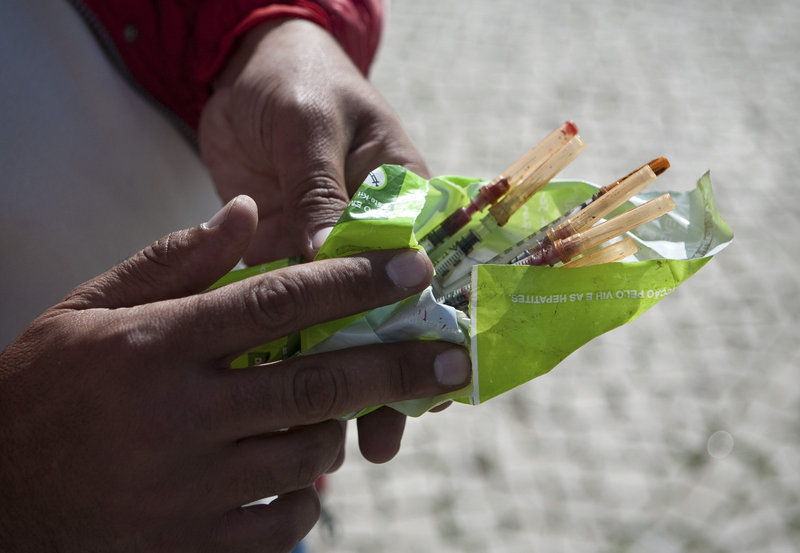Gov. LePage’s plan to spend $100 million on prison renovation is concerning (“LePage: Borrow $100 million for prison project,” Jan. 14), considering that the U.S. already incarcerates more of its citizens than any other nation in the world.
Since the war on drugs, the U.S. prison population has skyrocketed. The legal system has become so overrun with nonviolent drug use violations that drug courts have proliferated. Unfortunately, looking for another solution to this issue — other than a prison sentence — has not become a mainstream concern.
Although drug courts were created to ease this problem, the question remains, does the current drug policy make sense? Does incarcerating nonviolent drug users create a safer society? Have the numbers reflected that?
By expanding our current prison system, are we fooling ourselves into thinking that there is a need to do so, as opposed to changing our current drug policy, which, in effect, would result in downsizing prisons?
In 2000, Portugal decriminalized drug use and has not gone back to its old policies. In fact, Portugal now records a lower overall rate of drug usage than the European average.
According to the Metro World News, Jeffrey Miron, an economist from Harvard University, has estimated that the U.S. government would save $41.3 billion on police, courts and jails if it legalized drugs and earn another $46.7 billion by regulating and taxing drugs.
The Metro World News quotes a Portuguese citizen as saying, “Nobody should be punished for self-inflicted harm.”
Do we punish people for self-inflicted harm? And by punishing them with prison sentences, do we overspend and overcrowd our prisons with nonviolent offenders, creating an unnecessary push to renovate and expand our prison system? And if so, is it time to review our drug laws before we spend $100 million on renovating a prison?
Liz Dunn
Portland
Budget proposal overlooks duty to society’s neediest
As a dually board-certified adult primary care and psychiatric nurse practitioner, I work with patients who have chronic and persistent mental illness, as well as the predictable accompanying medical disorders inherent in this patient population.
As such, I am compelled to voice my opposition to the proposed total elimination of low-cost drugs for the elderly and disabled and the cuts to the Medicare Savings Program in the governor’s supplemental budget.
When my patients are faced with the inhumane choice of choosing between medications, heat or food, medications are the first cost to be eliminated.
Predictably, the conditions treated by their medications worsen, with ramifications including hospitalization, which reminds us all of the cost savings inherent in preventive and primary care, rather than tertiary care.
The individuals who will disproportionately carry the burden of these proposed cuts are Maine’s most vulnerable citizens.
According to information provided by the Southern Maine Agency on Aging, 72,000 Maine seniors and disabled people will lose some or all of the assistance they receive to pay for insurance premiums or prescription drug costs.
Of these, approximately 40,000 elderly will lose all or some of the help they currently receive through the Medicare Savings Program to help pay for premiums, co-payments and deductibles, prescription drug costs and coverage, through the so-called “doughnut hole.”
In closing, I share a quote from the last speech given by Hubert H. Humphrey:
“The moral test of government is how that government treats those who are in the dawn of life, the children; those who are in the twilight of life, the elderly; those who are in the shadows of life; the sick, the needy and the handicapped.”
Constance W. Jordan, MSN, ANP, PMHNP
CEO, Behavioral Health Resources
Cape Elizabeth
Does ‘right to bear arms’ apply to major armaments?
I have to agree with letter writer John Parker of Falmouth, who wonders why the National Rifle Association is against any limits on the size of gun magazines (“Scrutinize U.S. gun owners as closely as we do drivers,” Feb. 12).
Anyone who consistently advocates that the Second Amendment gives us all a right “to keep and bear arms” would do well to address a few issues:
Do you believe the numerous national laws that govern hand-held machine guns should be eliminated? Should we all be allowed to own and use rocket-propelled grenades? And what about MANPADS, or man-portable air-defense systems, a kind of surface-to-air missile?
These are all arms that can be borne. If the Second Amendment is as sacrosanct as many gun advocates argue, those people ought to argue that every man, woman and child has the right to own and use these three kinds of armaments.
If, on the other hand, it only makes sense that there should be limits to the scope of the Second Amendment, whether or not large magazines (or assault rifles) ought to be legal is open to question.
I very much doubt that anyone who flies, including members of the NRA, would be comfortable knowing that MANPADS were easily available.
William Vaughan Jr.
Chebeague Island
China, Russia surpass U.S. at ensuring income equality
In his Another View editorial, “Tax breaks for Maine employers benefit Maine’s workers, too” (Feb. 17), Don Kopp suggests that countries such as China and Russia that have tried to establish a more equal distribution of income have not succeeded.
Had Mr. Kopp taken the time to learn the details about how well China and Russia have done in creating “equal societies,” he would have discovered the answer is “pretty well.”
It turns out that for both of his examples, income equality is better than that in the United States. In a ranking of income equality published by the Central Intelligence Agency, at the top of the list was Sweden, China and Russia ranked 81st and 82nd, respectively, while the United States was 93rd.
I fear the other arguments he used in his essay may well be equally flawed.
Jonathan Mitschele
New Gloucester
Send questions/comments to the editors.



Comments are no longer available on this story